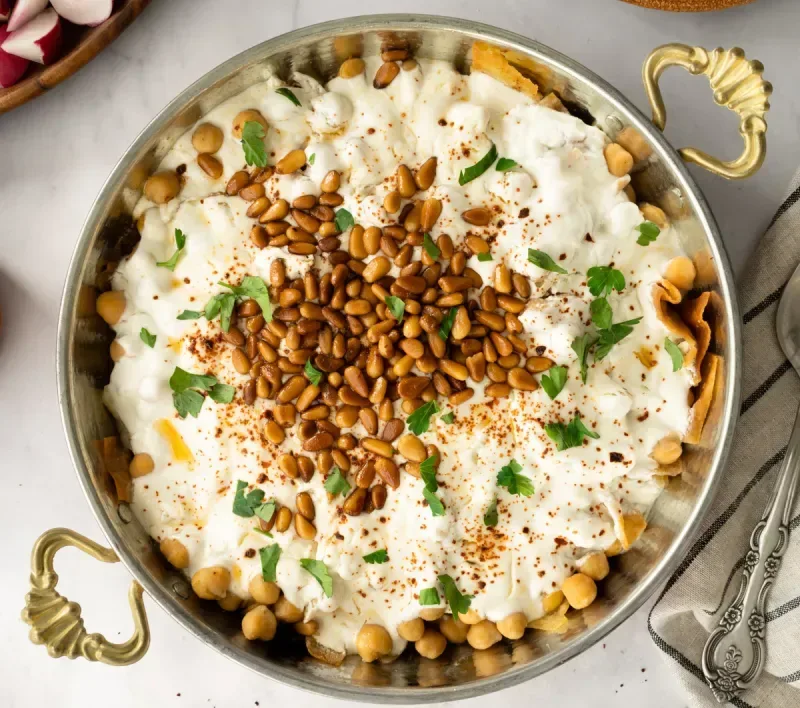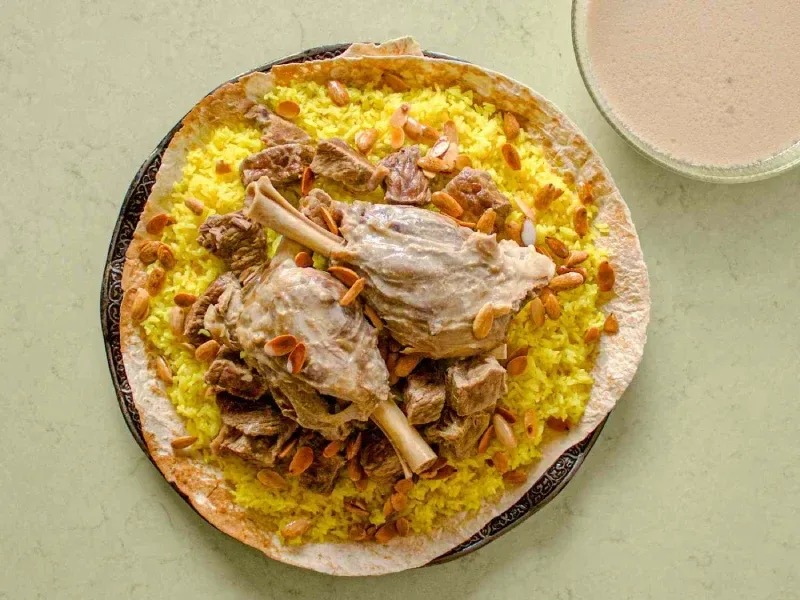Jordanian cuisine is a true reflection of the country’s history, culture, and hospitality. Influenced by Bedouin traditions, Levantine flavors, and Mediterranean ingredients, Jordan’s food is a delightful blend of spices, slow-cooked meats, fresh herbs, and fragrant rice dishes. Whether you're indulging in a traditional Jordanian feast or grabbing a quick street food bite, every meal in Jordan tells a story.
If you're planning a trip, get ready to embark on a flavorful journey through Jordan’s most beloved dishes. Here’s everything you need to know about the cuisine of Jordan.

1. Mansaf – The National Dish of Jordan
No trip to Jordan is complete without trying Mansaf, the country’s signature dish. A true symbol of Jordanian culture, Mansaf is a rich, flavorful meal traditionally served on special occasions and family gatherings.
Mansaf consists of tender lamb cooked in jameed (fermented dried yogurt), served over rice, and topped with toasted almonds or pine nuts. It is typically eaten with the right hand, following Bedouin customs, as a sign of respect and unity. The combination of savory lamb, tangy yogurt sauce, and fragrant rice makes this dish a must-try.
2. Maqluba – The Upside-Down Feast
Maqluba, meaning “upside down” in Arabic, is a hearty dish that surprises both in taste and presentation. A layered mix of rice, vegetables, and meat (usually chicken or lamb) is slow-cooked in a pot and then flipped upside down onto a serving plate. The result? A beautifully layered dish bursting with flavor.
Served with yogurt or a fresh salad, Maqluba is a favorite among locals and a comforting meal for visitors looking to experience authentic Jordanian home-cooked food.
3. Zarb – The Bedouin BBQ
For a truly unique dining experience, try Zarb, the traditional Bedouin barbecue cooked underground. Meat (usually lamb or chicken), along with potatoes and vegetables, is seasoned with a blend of Middle Eastern spices and placed in an underground sand oven. The slow cooking process results in smoky, tender, and flavorful meat.
Zarb is best enjoyed in Wadi Rum, where Bedouin families still prepare this dish in the desert under a sky full of stars. It’s not just a meal; it’s an experience!
4. Falafel & Hummus – The Ultimate Street Food Combo
Jordanian street food is simple, fresh, and incredibly tasty. One of the most popular snacks is Falafel, deep-fried chickpea balls, crispy on the outside and soft on the inside. In Jordan, falafel is often served with hummus, a creamy blend of mashed chickpeas, tahini, lemon, and garlic.
Head to Hashem Restaurant in Amman, a legendary spot for falafel and hummus, where locals and tourists gather to enjoy this delicious and affordable meal.
5. Shawarma – The King of Quick Bites
If you're on the go, Shawarma is the perfect choice. Thinly sliced marinated meat (chicken or lamb) is roasted on a vertical spit and wrapped in shrak, a thin Jordanian bread, with garlic sauce, pickles, and sometimes fries.
Shawarma stalls can be found all over Jordan, but Reem Shawarma in Amman is one of the most famous places to grab this delicious street food.
6. Kunafa – Jordan’s Sweet Indulgence
No meal is complete without dessert, and in Jordan, Kunafa is the ultimate treat. This sweet, cheesy pastry is topped with crispy shredded dough and drizzled with sugar syrup. It’s warm, gooey, and irresistibly delicious.
For the best Kunafa, visit Habibah Sweets in Amman, a local institution known for serving this beloved dessert since 1951.
7. Arabic Coffee & Tea – Jordanian Hospitality in a Cup
Jordanians take their coffee and tea seriously. Arabic coffee, also known as Gahwa, is a strong, cardamom-flavored coffee served in small cups, often as a gesture of hospitality.
Tea, or Shai, is typically brewed with mint or sage and sweetened with sugar. It’s common to be offered tea when visiting a shop or home, as hospitality is a key part of Jordanian culture.
8. Where to Eat in Jordan?
Best for Traditional Jordanian Food: Sufra Restaurant, Amman
Best for Street Food: Hashem Restaurant, Amman
Best for Desserts: Habibah Sweets, Amman
Best for Bedouin Cuisine: A camp in Wadi Rum
Final Thoughts
Jordanian cuisine is more than just food; it’s an experience that connects you with the country’s history, culture, and traditions. Whether you're savoring a plate of Mansaf, enjoying a shawarma wrap on the streets of Amman, or sipping Bedouin tea in the desert, every bite tells a story.
If you're planning your trip, be sure to explore the diverse flavors of Jordanian food—you won’t be disappointed!



